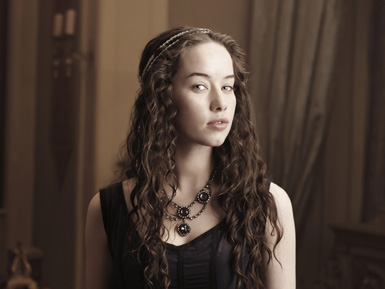Despite the pus and rot of plague, Reign still appears more a show of dresses and costumes (not historically accurate, of course, any more than anything else in the show is) paraded on a runway, that is fabricated out of a hodgepodge of Renaissance "architecture," decor and ornamentation."
The actresses -- and actors as well -- appear stand-ins for the producers' and writers' fantasies of power and romance as well as the fantasies of their intended audience -- with horses! swords! and castles! They are dressed like dolls, but like dolls they tend to look alike, while their acting is fairly non-existent, with the exception of Megan Follows and some others. However, Follows as Queen Catherine de Medici, isn't a girl like the others, and is an experienced actress of substance.

Lola

Mary
It is difficult at times to tell the girls apart, particularly when they aren't in the same scene. Mary and one of her ladies (her ladies, like her, historically, were all named Mary, which would never do in a television series -- not to mention England's Queen Mary Tudor), Lola -- really? Lola, from Scotland in the 16th century?* -- look so much alike that in the early episodes they are nearly identical. Soon the stylists had to give Lola extra-curly hair in every scene so we could distinguish her lady-in-waiting more easily from Mary Queen of Scots. The actresses' voices have the same pitch, and they deliver their lines in the same flat manner. Their acting range goes from standing there to talking head -- but then, neither do the male actors. Both young men and women indicate firmness of whatever by clenching their teeth, sort of.
A strange show, that is possessed of an extravagant budget that allows for Irish castles and even the veddy high class castle turned hotel, outdoor sequences, the wardrobes and all those jewels. It also was able to create enormous additional sets that stand in for the French royal castle, with ceilings even, that few shows can afford.
As well as plundering history, the writers plunder familiar fantasy fiction, presenting recognizable story lines from other sources. After the pilot was picked up, and at some point into the CW commissioned episode, CW asked for a full season of 23 episodes, thus the need to write very fast, with a principle plot that turned on little than will she or won't she end up with her true love, or will she be killed before she decides, it would be necessary to grab from somewhere. But this grabbing doesn't have the same non-self-conscious insouciant glee of not taking oneself seriously that gave the first seasons of Lost Girl such fun and verve.
As a tween and teen I'd have adored Reign -- horses! swords! castles! that mixes in monsters and other supernatural something-or-other. At that age I wouldn't have noticed writing weaknesses or poor acting.
But even at that age, with my schooling in costume via the period art illustrations in my piano lesson books of adaptations of classical composers works, and The Book of Knowledge spreads of Renaissance art and portraits, I would have noticed the clothes were not really period. With the comparative knowledge of Jewish, Catholic and Protestant religions, and their historical milieus, already drilled into me via our church's pastor, I would have been much annoyed by how the show attempts to make pagans some sort of magic stand-in for the French protestants, the Huguenots, by calling the pagans heretics. Then as now, that is wrong. A heretic is:
1 : a dissenter from established religious dogma; especially : a baptized member of the Roman Catholic Church who disavows a revealed truth. 2 : one who dissents from an accepted belief or doctrine : nonconformist.
Pagans cannot be heretics for they were never baptised into the Church, or left the Church. However, as far as the Roman Church and French royals were concerned, the Huguenots were heretics.
But a show doesn't want to offend anyone, and nobody would want to speak in a Catholic country (much of the first season was shot in Ireland), probably, of how, in this very era, Queen Catherine de Medici and King Francis -- Mary Queen of Scots' husband -- and that following with Louis XIV, killed, burned, tortured and looted the Protestants -- a pogrom. Named enemies of France, thousands who were able fled the country -- which created serious financial troubles for Louis XIV.
Moreover, as King Francis participated in this, and he's the romantic lead, the writers wouldn't want to mention the historical actualities. Particularly the show wouldn't want to mention how much his Queen, Mary of Scots, Reign's female romantic lead, encouraged him in the prosecution.
History, the bathtub in which everybody's entitled to potch! Full speed ahead! Watch out for Abraham Lincoln hunting vampires who create the plague -- as well as African American slavery.
* Lola is the diminutive for the Spanish Dolores -- "sorrows" as in Nuestra Senora de los Dolores. Wiki helpfully informs that:
Lola may also be used as a short form of the unrelated German name Aloisia. The name Lola is also common in Africa; in Nigeria, many feminine names are shortened to Lola, such as Temilola or Damilola. Lola (Tajik for tulip) is also a feminine name in Uzbekistan, Tajikistan, and Afghanistan. It is derived from the Persian لاله or lâleh.

1 comment:
Would Reign fit into the classification, "fantasy uchronia"?
Post a Comment